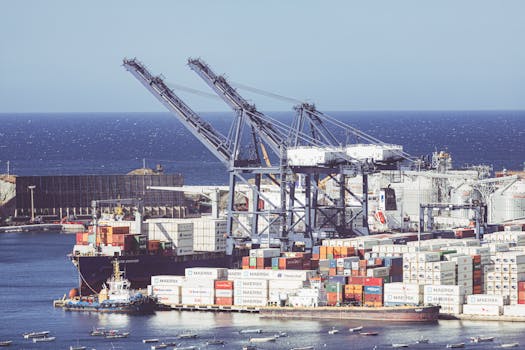Companies with the best and the worst technicals.
Lists of companies in NSE500 with the best and the worst technicals...
Lists of companies in NSE500 with the best and the worst technicals...
Lists of companies in NSE500 with the best and the worst fundamentals...
List of the latest important filings for NSE500....

The article examines the effects of tariffs on Japan's automotive exports, discussing...

The article discusses the significant impacts of the recent bombings in Iran...

The potential closure of the Strait of Hormuz by Iran could lead...

In the ever-evolving landscape of telecommunications, Vodafone Idea has taken a significant stride into the future by announcing its strategic partnership with AST Spacemobile. This collaboration marks a paradigm shift in the deployment of satellite-based broadband services in India, leveraging cutting-edge technology to reach underserved areas and enhance connectivity. With rising demand for seamless internet access, particularly in rural and remote regions, the AST Spacemobile partnership presents a pivotal opportunity for Vodafone Idea to accelerate its growth and redefine its service offerings.
Satellite-based broadband technology is poised to revolutionize the way consumers access the internet, particularly in areas where traditional broadband services are either inadequate or nonexistent. AST Spacemobile, a US-based company, is at the forefront of this innovation, developing a global cellular broadband service provided directly from space. This service allows mobile devices to connect to the internet without the need for ground infrastructure, significantly expanding the reach of connectivity.
According to estimates, approximately 600 million people in India lack reliable internet access. By harnessing AST Spacemobile's satellite network, Vodafone Idea aims to bridge this digital divide, providing millions of users with high-speed broadband connectivity. The partnership is especially critical as India aims to enhance its digital infrastructure as part of its broader economic goals.
Vodafone Idea’s partnership with AST Spacemobile is grounded in a robust technical framework designed to facilitate seamless integration between terrestrial and satellite networks. AST Spacemobile is developing a constellation of low Earth orbit (LEO) satellites capable of covering vast territories. These satellites will enable Vodafone Idea to deliver broadband services directly to compatible devices without the need for additional hardware or infrastructure.
Early tests have shown that AST Spacemobile's LEO satellites can provide download speeds of up to 30 Mbps with latency suitable for applications such as video calls and online gaming. The company aims to launch its first satellites in 2026, with plans to expand its constellation to over 168 satellites within the next few years. This expanded coverage will not only enhance connectivity in urban areas but also bring broadband access to the most remote corners of the country.
The demand for mobile data in India continues to surge, with the number of internet users reaching over 850 million as of 2025. The partnership between Vodafone Idea and AST Spacemobile represents a timely intervention, not only broadening the customer base for the telecommunications provider but also enhancing user experiences across various digital platforms.
The Indian government has been actively pushing for increased digital inclusion through initiatives like Digital India. By entering into this partnership, Vodafone Idea positions itself as a key player in this initiative, aiming to support the government's vision by delivering internet services in previously underserved regions.
Furthermore, this collaboration enables Vodafone Idea to diversify its service offerings to include not just conventional mobile services but also a broader suite of digital solutions ranging from ecommerce platforms to telemedicine services. The potential for new market segments opens up exciting business avenues and revenue streams.
Despite the promising outlook, the partnership between Vodafone Idea and AST Spacemobile is not without challenges. Key among these is ensuring the reliability and quality of service as the technology advances. The performance of satellite broadband is often variable, affected by geographical conditions and weather phenomena. Vodafone Idea must maintain rigorous quality control to ensure customer satisfaction.
Additionally, regulatory hurdles in satellite communications can pose significant obstacles. The Indian government has stringent policies regarding satellite licensing and frequency allocations, which could affect rollout timelines. Effective collaboration with regulatory bodies will be essential for the success of this venture.
Consumer reception to the partnership has been cautiously optimistic, with many expressing eagerness for the potential improvements in connectivity. Vodafone Idea has committed to conducting pilot programs in select rural areas to gauge user experiences and gather feedback before a full-fledged launch.
Financial analysts project that the satellite broadband market could reach upwards of $900 billion globally by 2030, with significant contributions from emerging markets like India. Vodafone Idea's proactive approach in aligning itself with innovative solutions like satellite broadband could position it favorably against competitors in the telecommunications arena.
In closing, the partnership between Vodafone Idea and AST Spacemobile stands at the forefront of a transformative movement in the telecommunications industry. With the potential to connect millions and usher in a new era of digital engagement, this collaboration could redefine access to information and services across India. As the journey unfolds, all eyes will be on Vodafone Idea to see how it executes this ambitious venture and its impact on the future of digital connectivity.

Examining the implications of Nippon Steel's acquisition offer for U.S. Steel, focusing...

Meta Platforms Inc. has initiated a $100 million strategy to attract top...